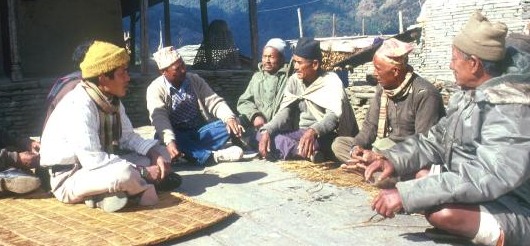Agarwal, B. 2001. Participatory exclusion, community forestry and gender: an analysis for South Asia and a conceptual framework. World Development, 29(10): 1623–1648.
ANSAB. 2010. Entrepreneurship development of natural resources dependent communities. Kathmandu, Asia Network for Sustainable Agriculture and Bioresources (ANSAB).
Blomley, T. & Ramadhani, H. 2006. Going to scale with participatory forest management: early lessons from Tanzania. International Forestry Review, 8(1): 93–100.
Chambers, R. 2007. From PRA to PLA and pluralism: practice and theory. IDS Working Paper 286. Brighton, UK, Institute of Development Studies (IDS).
Cornwall, A. 2008. Unpacking ‘participation’: models, meanings and practices. Community Development Journal, 43(3): 269–283.
Davis Case, D. 1990. The community’s toolbox: the idea, methods and tools for participatory assessment, monitoring and evaluation in community forestry. Rome, FAO.
De Bruyn, T. & Veer, C. 2014. Strengthening forest tenure systems and governance. Training module for facilitators. Bangkok, FAO and Regional Community Forestry Training Center for Asia and the Pacific (RECOFTC).
Engel, A. & Korf, B. 2005. Negotiation and mediation techniques for natural resource management. Rome, FAO.
Evans, K. & Guariguata, M.R. 2008. Participatory monitoring in tropical forest management: a review of tools, concepts and lessons learned. Bogor, Indonesia, Center for International Forestry Research (CIFOR).
Evans, K., De Jong, W., Croncleton, P., Sheil, D., Lynam, T., Kusumanto, T. & Colfer, C.J.P. 2006. Guide to participatory tools for forest communities. Bogor, Indonesia, Center for International Forestry Research (CIFOR).
FAO. 2015. Community-based forest enterprise development. Website.
Gambia Forestry Department. 2005. Community forestry implementing guidelines. Forestry Department Participatory Forest Management Unit. Banjul.
Gambia Forestry Department. 2011. Field manual on community forestry start-up and implementation. Forestry Department Participatory Forest Management Unit. Banjul.
Geilfus, F. 2008. 80 tools for participatory development: appraisal, planning, follow-up and evaluation. San Jose, Instituto Interamericano de Cooperación para la Agricultura (IICA).
Gerez, P. & Purala, S.E. 2008. Guía práctica forestal de silvicultura communitaria. México, Secretaría de Medio Ambiente y Recursos Naturales (SEMARNAT), Comisión Nacional Forestal (CONAFOR) and Consejo Civil Mexicano para la Silvicultura Sostenible (CCMSS).
Jackson, W.J. & Ingles, A.W. 1998. Participatory techniques for community forestry: a field manual. Gland, Switzerland and Cambridge, UK, International Union for Conservation of Nature, AusAID and WWF.
Kamp, M. 2011. Facilitation skills and methods of adult education. Kampala, Konrad-Adenauer Stiftung.
Knur, L., Reeb, D. & Dudlee, P. 2011. Ойн Нөхөрлөл Байгуулахад Таны Мэдвэл Зохих Зүйлс [Participatory forest management in Mongolia. Manual 1: How to facilitate the establishment of forest user groups in Mongolia]. Ulaanbaator, Mongolian Ministry of Nature, Environment and Tourism and FAO. Published in Mongolian.
Lecup, I. & Nicholson, K. 2004. Defining where you want to end up. Revised booklet B, Annex 6, pp. 46–48. Rome, FAO.
Lecup, I. 2011a. Community-based tree and forest product enterprises: market analysis and development. Manual. Rome, FAO.
Lecup, I. 2011b. Community-based tree and forest product enterprises: market analysis and development. Field facilitator guideline. Rome, FAO.
Means, K. & Josayma, C. 2002a. Community-based forest resource conflict management. A training package. Volume 1. Bangkok, FAO and Regional Community Forestry Training Center for Asia and the Pacific (RECOFTC).
Means, K. & Josayma, C. 2002b. Community-based forest resource conflict management. A training package. Volume 2. Bangkok, FAO and Regional Community Forestry Training Center for Asia and the Pacific (RECOFTC).
O’Hara, P. 2009. Enhancing stakeholder participation in national forest programmes: tools for practitioners. Rome, FAO.
O’Hara, P. 2010. Enhancing stakeholder participation in national forest programmes: a training manual. Rome, FAO.
Raik, D.B. & Decker, D.J. 2007. A multisector framework for assessing community-based forest management: lessons from Madagascar. Ecology and Society, 12(1): 14.
Rietbergen-McCracken, J. & Narayan, D. 1998. Participation and social assessment: tools and techniques. Washington, DC, The World Bank.
Said, A. & O’Hara, P. 2010. Participatory forest management guidelines. Non Timber Forest Project – Participatory Forest Management– Research and Development Project, South West Ethiopia. Mizan Teferi and Addis Ababa, Ethiopia.
SVAW. 2015. Training methods: guided discussion. Advocacy tools. Women’s human right training. Website. Stop Violence Against Women (SVAW).
Sutherland, A. 1998. Participatory research in natural resources. Socio-economic methodologies. Best practice guidelines. Chatham, UK, Natural Resources Institute.
Taylor, P.L., Cronkleton, P., Barry, D., Stone-Jovicich, S. & Schmink, M. 2008. If you saw it with my eyes: collaborative research and assistance with Central American forest steward communities. Bogor, Indonesia, Center for International Forestry Research (CIFOR).
VSO. 2009. Participatory approaches: a facilitator’s guide. Voluntary Services Overseas (VSO).
Wilde, V. 2001. Field level handbook. Socio-Economic and Gender Analysis Programme. Rome, FAO.
Zimmermann, R. 1983. Management of upland watersheds: participation of the mountain communities. FAO, Rome.

